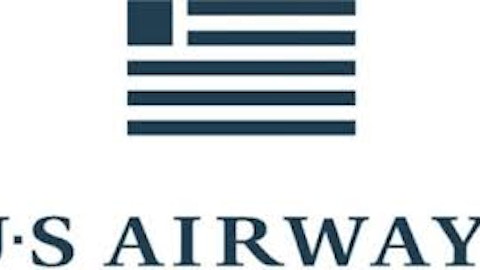On the other hand, United Continental could be a big loser, as it competes with American in several markets. On balance, a stronger American with a broader network will be a more formidable competitor and could gain market share at United’s expense. While executives at United and Delta have publicly supported the US Airways-American merger, their arguments that the move will improve pricing ring hollow. Pricing on international routes is already strong, while Southwest has been the “gatekeeper” for domestic fare hikes. In other words, US Airways and American Airlines have not been impediments for fare hikes, so their merger does not change anything. United stock’s 45% gain over the past three months cannot really be explained by a corresponding improvement in the company’s prospects.
Oil prices pull back
Merger speculation drove gains for airline stocks in late 2012 and early 2013, despite a concurrent rise in oil prices. However, oil prices have since receded, due in part to worries about the global economy. Oil’s slide over the past several weeks has helped many airline stocks rise even further during that period of time.

Monthly Oil Price Chart data by YCharts
Over the next year or two, Brent prices may continue to retreat, as implied by the futures curve. From a fundamental perspective, sluggish growth and efficiency gains in developed economies are offsetting much of the demand growth from emerging economies, while the shale oil boom in North America has led to rapidly increasing production. However, oil prices have fallen only to spike again on several occasions in recent years. It is therefore very risky to buy airlines indiscriminately in the hope that falling oil prices will boost profits: A sudden oil price spike could quickly send airline stocks lower. All airlines will benefit from falling oil, but it is worthwhile to be “choosy.”
What should you do?
Delta and US Airways have been the most consistent performers in the sector and have modest valuations. There is a bigger cushion for those two stocks if airline industry fundamentals or investor sentiments deteriorate. However, I prefer Delta because of its stability and profitability. Even if oil prices spike higher and American gains corporate market share after merging with US Airways, Delta has enough margin growth drivers of its own to justify holding the stock. US Airways is riskier because it is entering a merger integration process that, based on recent airline merger history, is likely to cause some hiccups.
The article Major Airline Stocks Soar: Should You Sell? originally appeared on Fool.com and is written by Adam Levine-Weinberg.
Fool contributor Adam Levine-Weinberg owns shares of Delta Air Lines and is short Mar $14 calls on Delta Air Lines. Adam Levine-Weinberg is short shares of United Continental Holdings (NYSE:UAL). The Motley Fool recommends Southwest Airlines.
Copyright © 1995 – 2013 The Motley Fool, LLC. All rights reserved. The Motley Fool has a disclosure policy.



